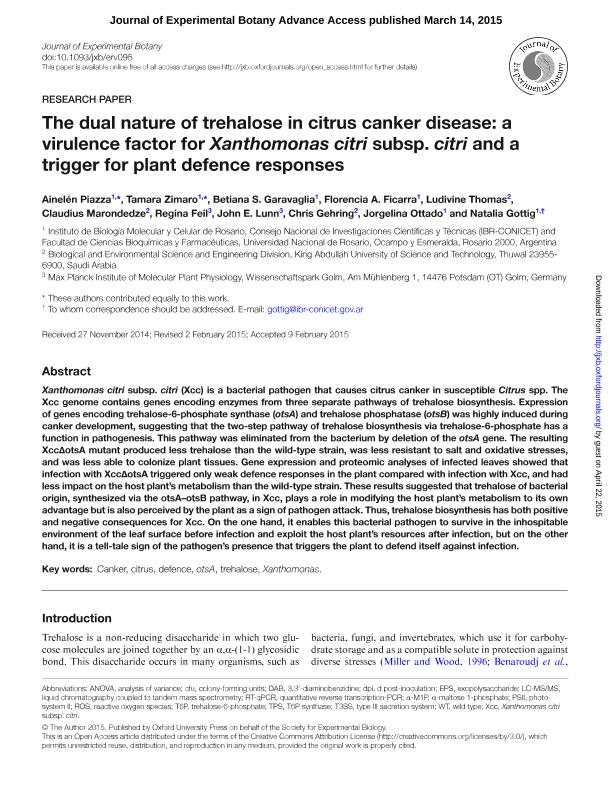Artículo
The dual nature of trehalose in citrus canker disease: A virulence factor for Xanthomonas citri subsp. citri and a trigger for plant defence responses
Piazza, Ainelén Melanie ; Zimaro, Tamara
; Zimaro, Tamara ; Garavaglia, Betiana Soledad
; Garavaglia, Betiana Soledad ; Ficarra, Florencia Andrea
; Ficarra, Florencia Andrea ; Thomas, Ludivine; Marondedze, Claudius; Feil, Regina; Lunn, John E.; Gehring, Chris; Ottado, Jorgelina
; Thomas, Ludivine; Marondedze, Claudius; Feil, Regina; Lunn, John E.; Gehring, Chris; Ottado, Jorgelina ; Gottig Schor, Natalia
; Gottig Schor, Natalia
 ; Zimaro, Tamara
; Zimaro, Tamara ; Garavaglia, Betiana Soledad
; Garavaglia, Betiana Soledad ; Ficarra, Florencia Andrea
; Ficarra, Florencia Andrea ; Thomas, Ludivine; Marondedze, Claudius; Feil, Regina; Lunn, John E.; Gehring, Chris; Ottado, Jorgelina
; Thomas, Ludivine; Marondedze, Claudius; Feil, Regina; Lunn, John E.; Gehring, Chris; Ottado, Jorgelina ; Gottig Schor, Natalia
; Gottig Schor, Natalia
Fecha de publicación:
05/2015
Editorial:
Oxford University Press
Revista:
Journal of Experimental Botany
ISSN:
0022-0957
e-ISSN:
1460-2431
Idioma:
Inglés
Tipo de recurso:
Artículo publicado
Clasificación temática:
Resumen
Xanthomonas citri subsp. citri (Xcc) is a bacterial pathogen that causes citrus canker in susceptible Citrus spp. The Xcc genome contains genes encoding enzymes from three separate pathways of trehalose biosynthesis. Expression of genes encoding trehalose-6-phosphate synthase (otsA) and trehalose phosphatase (otsB) was highly induced during canker development, suggesting that the two-step pathway of trehalose biosynthesis via trehalose-6-phosphate has a function in pathogenesis. This pathway was eliminated from the bacterium by deletion of the otsA gene. The resulting XccΔotsA mutant produced less trehalose than the wild-type strain, was less resistant to salt and oxidative stresses, and was less able to colonize plant tissues. Gene expression and proteomic analyses of infected leaves showed that infection with XccΔotsA triggered only weak defence responses in the plant compared with infection with Xcc, and had less impact on the host plant's metabolism than the wild-type strain. These results suggested that trehalose of bacterial origin, synthesized via the otsA-otsB pathway, in Xcc, plays a role in modifying the host plant's metabolism to its own advantage but is also perceived by the plant as a sign of pathogen attack. Thus, trehalose biosynthesis has both positive and negative consequences for Xcc. On the one hand, it enables this bacterial pathogen to survive in the inhospitable environment of the leaf surface before infection and exploit the host plant's resources after infection, but on the other hand, it is a tell-tale sign of the pathogen's presence that triggers the plant to defend itself against infection.
Palabras clave:
Canker
,
Citrus
,
Defence
,
Otsa
,
Trehalose
,
Xanthomonas
Archivos asociados
Licencia
Identificadores
Colecciones
Articulos(IBR)
Articulos de INST.DE BIOLOGIA MOLECULAR Y CELULAR DE ROSARIO
Articulos de INST.DE BIOLOGIA MOLECULAR Y CELULAR DE ROSARIO
Citación
Piazza, Ainelén Melanie; Zimaro, Tamara; Garavaglia, Betiana Soledad; Ficarra, Florencia Andrea; Thomas, Ludivine; et al.; The dual nature of trehalose in citrus canker disease: A virulence factor for Xanthomonas citri subsp. citri and a trigger for plant defence responses; Oxford University Press; Journal of Experimental Botany; 66; 9; 5-2015; 2795-2811
Compartir
Altmétricas



